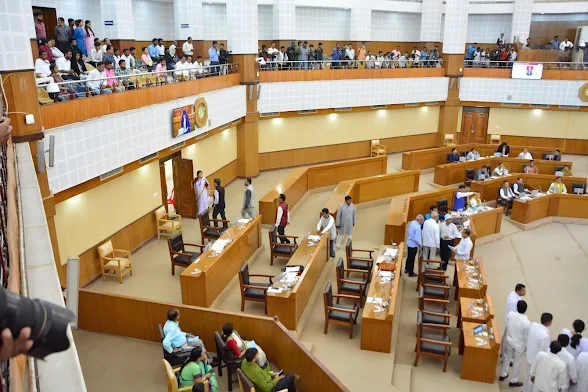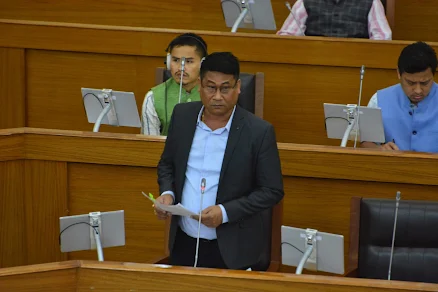Third Day of the Assembly: Tripura Legislative Assembly 7th Session – Detailed Question Hour Report Date: Tuesday, 25th March 2025
Read complete Report at the bottom
The 7th Session of the Tripura Legislative Assembly witnessed an intensive Question Hour, with legislators raising 55 questions across multiple departments. The discussions primarily revolved around infrastructure development, healthcare accessibility, tribal welfare, and governance reforms, reflecting the state’s commitment to inclusive growth.
1. Infrastructure and Rural Development
A significant portion of the questions focused on rural infrastructure, particularly the construction of community halls. Legislators from Chawamanu, Kamalasagar, Karmachhara, and Takarjala constituencies sought updates on the status of proposed modern community halls in their respective blocks. Key concerns included:
Delays in project execution due to administrative bottlenecks or fund allocation issues.
Proposed timelines for completing pending constructions.
Transparency in fund utilization to ensure timely delivery of projects.
Members emphasized that community halls serve as vital hubs for social and cultural activities, and delays in their construction disproportionately affect rural populations. The Rural Development Department was urged to expedite approvals and monitor progress closely.
2. Healthcare and Welfare Schemes
The Health & Family Welfare Department faced rigorous scrutiny regarding the implementation of two major health schemes:
Pradhan Mantri Arogya Bharat Yojana (PMABY)
Chief Minister’s Health Scheme
Legislators demanded:
Detailed data on the number of patients treated at Primary Health Centers (PHCs) and Community Health Centers (CHCs) in the 2023-24 fiscal year.
Total beneficiaries registered under these schemes, with a breakdown by district.
Challenges in last-mile delivery, particularly in tribal and remote areas where healthcare access remains limited.
The discussion also touched upon the need for more specialist doctors and better-equipped facilities in rural hospitals to reduce patient referrals to urban centers.
3. Power and Electrification
The Power Department was questioned about delays in electrification projects, especially in Chawamanu’s remote villages. Legislators sought:
A clear roadmap for providing electricity to unelectrified villages.
Reasons for delays, whether due to logistical issues, fund shortages, or bureaucratic hurdles.
Proposed deadlines for project completion to ensure accountability.
Members highlighted that reliable electricity is crucial for education, healthcare, and economic activities, and delays hinder overall development in tribal-dominated regions.
4. Tribal Welfare and Education
A major focus of the session was on improving educational opportunities for tribal students. Key discussions included:
Expansion of coaching facilities for competitive exams.
Admission policies in Ashram Schools, Eklavya Model Residential Schools (EMRS), Sainik Schools, and Jawahar Navodaya Vidyalayas (JNV).
Ensuring equitable access for tribal students in model schools.
Legislators stressed the need for special scholarship programs and mentorship initiatives to bridge the educational gap between tribal and non-tribal students.
5. Panchayati Raj and Governance Reforms
The session also addressed decentralized governance, with discussions on:
Increasing honorariums for District Council Presidents, Vice Presidents, Panchayat Heads, and Committee Chairpersons.
Providing fixed remuneration for three-tier Panchayati Raj Institution (PRI) members to ensure their active participation in governance.
Timely fund disbursement to Gram Panchayats for smoother implementation of welfare schemes.
Members argued that better financial incentives would strengthen grassroots democracy and improve service delivery in rural areas.
6. Medical Education and Infrastructure
To address the shortage of medical professionals, legislators raised questions on:
Establishing new Homeopathic and Ayurvedic colleges to promote alternative medicine.
Setting up a Government Medical College in Dharmanagar or Dhalai district to reduce the burden on Agartala-based institutions.
Improving rural healthcare training programs to retain doctors in remote areas.
Conclusion and Next Steps
The 7th Session’s Question Hour highlighted critical gaps in rural infrastructure, healthcare, tribal education, and governance. Legislators pushed for time-bound action plans, greater transparency, and stricter monitoring mechanisms to ensure effective implementation of schemes.
The concerned departments are expected to submit detailed responses in the coming days, outlining concrete steps to address these issues. The Assembly’s proactive approach reflects its commitment to balanced and equitable development across Tripura.



.jpeg)





Comments
Post a Comment